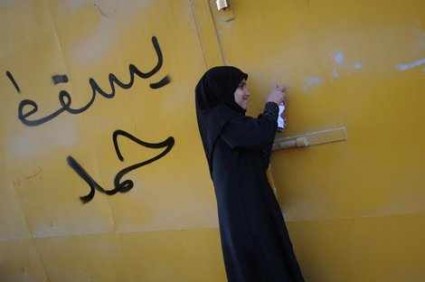Barricaded in Bahrain
Barricaded in Bahrain
Joost Hiltermann and Kelly McEvers – 27 December, 2011 – NYR

AFP/Getty Images – Bahraini girl calling for the ouster of King Hamad, after funeral for Abdelnabi Kadhim, Manama, November 24, 2011
On November 23, Manama, the modern capital of the tiny Gulf nation of Bahrain, was in an uncharacteristically welcoming mood. Foreign reporters—allowed into the country for the first time in months—were swamped with invitations to a “celebration” at a posh royal palace and offered interviews with usually reticent Bahraini officials. The occasion was the long-awaited release of a report about the government’s strong-armed handling of last spring’s popular uprising. Since the report had been requested—and paid for—by the government itself, officials were expecting a few minor criticisms. Then, they reasoned, the country would move on.
Things didn’t go according to plan.
For one thing, the country shows little sign of moving on from the uprising last February and March, in which government forces brutally cracked down on tens of thousands of people—men and women—many of them belonging to the country’s Shia majority, who had taken to the streets for weeks to voice grievances against the ruling family, who are Sunni. At least 35 people were killed, mostly by security forces and pro-government mobs; thousands were detained; and hundreds of activists, political figures and professionals such as doctors, nurses, lawyers and athletes were tried in closed-door military courts and jailed. And there is still widespread fear of more violence.
In fact, the morning the ceremony was to take place, reports began circulating that a 44-year-old man named Abdelnabi Kadhim had been killed under suspicious circumstances in the small, poor Shiite village of Aali, about an hour from the capital. A handful of us went to see what happened. Like so many of “the villages,” as the Shiite towns outside the capital are called, Aali is a dusty collection of two- and three-story houses made of plywood, corrugated steel, plaster, and bare concrete floors. Substandard housing, high unemployment, and a sense of unequal treatment have made Aali one of a dozen or so centers of protest.
According to people in the village, Kadhim’s car had been rammed by riot police as he was driving his wife to work. (By the time we got to Aali, the car had been removed.) Kadhim had been a regular presence at village protests. When the women in Kadhim’s family gathered to mourn his death, riot police fired tear gas canisters into their home. Neighbors showed us the broken glass from the attack. As they described what happened, a small group of young men and women gathered outside Kadhim’s house to shout, “Down down Hamad!” calling for the overthrow of Bahrain’s King Hamad Bin Isa Al-Khalifa. …more





























